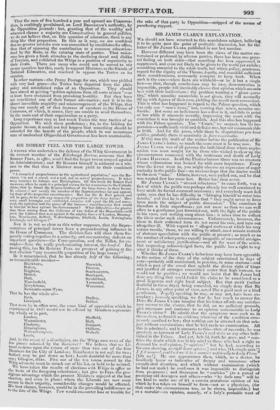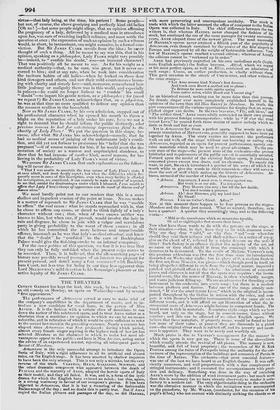SIR JAMES CLARK'S EXPLANATION.
WE should not have returned to this scandalous subject, believing, it to be quite past the point of profitable discussion, but for the. letter of Sir JAMES CLARK published in our last number.
However different may have been the views of the matter en- tertained or professed by adverse parties, there has been one gene- ral feeling on both sides—that something has been suppressed, is suppressed, and even not likely to be given to the world yet awhile; something essential to the whole truth, but which policy, prudence,• regard tbr the dignity of the Throne, loyalty, and manifold sufficient &cite considerations, necessarily conspire to keep back. When such is the case—when facts are withheld—or be it but a single fact—so that, though conclusions may be easy, demonstration impossible, people will inevitably choose that opinion which accords. best with their inclinations : the problem wanting " given quan-
tity," which quantity meanwhile is out given, they will assuredly
liii up with figures of their own, yielding the result most convenieut. This is what has happened in regard to the Palace question, which,
has only one " screw loose," but, wanting that screw, remains nil-. fixable. But many an indictment has a flaw in it, and fails in point so' law while it succeeds morally, impressing the court with the,.
conviction it was brought to establish. And this also has happened with the Palace question. The " Court," we suspect, has its im-
pression—a sufficiently vivid and definite one, but not communicable in l 839. And for the press, while there be disputations pro bono. public°, probably there is unanimity Aro conseienthe. If this was the truth of the matter betbre the publication of Sir JAMES CLARK'S letter, so much the more must it be true now. Sir JAMES CLARK was of all persons the individual from whom expla-, nation was most sought for by those who wished to clear up t4; circumstances connected with the trefi.tment and death of Lady. FLORA HAsrixos. In all the Pimlico burrow there was no creature. whose exhumation was looked for with more impatience. Every time the ferret went in, you might observe an expression of eager curiosity in the public face—an anxious hope that the doctor would be the next " take." Others, however, were pulled out, and he that., was wanted first has conic last. Better kite than never.
Sir JAMES CLARK'S "utmost reluctance" to come forth, was fact of which the public was perhaps already too well convinced to., have made its formal averment necessary ; and everybody must feel quite ,sure Mat he has difficulty in "bringing himself to enter into details," and that he is of opinion that "they ought never to. have: been made the subject of public discussion." The exordium is therefore a little superfluous; yet not more so than we can well allow to a gentlemen just ferretted out, with the light of the public in his eyes, and nothing snug about him : it takes time to collect. the ideas under such circumstances. Unfortunately, however, the ideas in their collected. form do not mend his case, and turn Out. altogether ill. With regard to " alleged motives at which his very nature recoils," those, we are willing to admit, must remain matter* of abstract speculation with the public at present ; as much so as the conduct of other parties equally incapable of successful arraign-, inent or satisactory justification—and all for want of the screw. But respecting acknowledged facts, the public has a right to say what it thinks of them.
Whether Sir JAMES CLARK'S behaviour may have been a,greeabIe to the notion of the duty of the subject entertained in days of yore—probably still maintained, in practice, in some stations—and which is part of the creed that upheld the divine right of kings and justified all outrages committed under that high warrant, we would not be positive ; we would not insist that Sir JAMES had, done any thing that could forfeit his claim to be considered as a good liegeman and right loyal subject. But that merit (rather doubtful in these days) being conceded, we simply deny that Sir JsmEs, in any other point of view, acted like a good man or a kind gentleman. Laya/iy speaking, he may, or may not, have been ex- emplarv ; humanly speaking, we fear he has much to answer for. Does Sir JAMES OAR!: imagine that his letter affords any satisfac- tory atrAwer to the charge, that he did, on no sufficient grounds, give utterance and currency to an opinion unfitvourable to Lady FLons's virtue ? He admits that the symptoms were such as, in thelas,Aves, to furnish no evidence whatever of the condition erro- neously ascribed to her ; that nothing can be attested on that sub- ject without examination; that he had made no examination. All this is admitted ; and it amounts to this—that, of necessity, he was precisely as ignorant of Lady Feoaa's real state as any other indi- vidual in the Palace. And yet, behold, fbrth he goes, and " con- fides the doubt which was in his mind to those who had a right to demand his real opinion, [" opini.m ! " bat he had, according to his own showing, no right to an opiida.] and who, [0, simple man If assured, could ii it use it in a manner unfriendly to Lady Flora." [Oh no !] He saw appearances then, which, as a doctor, he finniliirly knew as indicative of dropsy and numerous other complicated disorders, and which without examination (which he had not made) he confesses it was impossible to distinguish from pregnancy ; and thereupon he "confides" (to a parcel of gossiping old dowagers and others—who "lie feels sure' will be too kind to make use of it) a certain gratuitous opinion of his which he has taken on himself to form—not as a physician, (for that under the circumstances was, as he shows, impossible,) but as a ntoralistati opinion, namely, of a lady's probable want of
virtue—that lady being, at the time, his patient ! Some people— but not, of course, the above gossiping and perfectly kind old ladies [Oh no! ]—but some people might allege, that an opinion affirming the pregnancy of a lady, delivered by a medical man in attendance upon her, was sure of receiving implicit reliance, and must settle the question at once ; the expression of such an opinion by such a witness would, in short, be tantamount, one might conceive, to a formal con-
viction. But Sir JAMES CLARK recoils from the idea ; he never thought of such a thing. All he meant to say was this, that in his opinion, speaking as a philosopher, Lady FLORA might very possibly
be—indeed, to " confide his doubt," was—an immoral character ! That was positively all he meant to say. As for his weight as a medical authority—that, to be sure, was great, but it never oc- curred to him ; and at any rate, when he took into consideration the taciturn habits of old ladies—when he looked on those dear kind dowagers and others, and saw their mild countenances beam- ing with charity and sisterly love—and, moreover, remembered how little jealousy or malignity there was in this world, and especially
in palaces—he could no longer forbear to " confide" his small " doubt"—to impart his gentle notion, as a philosopher; for (need we repeat ?) Sir JAMES CLARK acknowledges that, as a physic/on, he.was at that time no snore qualified to deliver any opinion than the meanest scullion in the household.
Now as Sir JAMES CLARK, by his own admission, stepped out of his professional character when he opened his mouth to throw a blight on the reputation of a lady under his care, have we not a right to demand that he should inform the public distinctly, what precitnts reasons he had for entertaining impressions fatal to the chastity of Lady Flora ? We put the question in this shape, be- cause, after what Sir JAMES has acknowledged—namely, that he had no medical means of judging of the unfortunate lady's condi- tion, and did yet not forbear to pronounce his "belief that she was pregnant"—it of course remains for bins, if' he would avert the de- testation of society as a wanton and unprincipled slanderer, to show that he had reasons of another kind, moral reasons, for be- lieving in the probability of Lady FLORA'S want of virtue. We assure Sir JAMES CLARK that such explanations as the follow- ing will never do- " That I was unable to ascertain the true nature of Lady Flora's state, I at onee admit, and most deeply regret ; but when the difficulties which fre- quently occur in cases of this description, even when every facility is afforded for investigation, are considered, it can scarcely be made a matter of reproach to me that, amidst the disadvantages under which I laboured, I was unable to affirm that Lady Flora's change of appearance was the result of disease and aeuse alone."
We need hardly point out to our readers that this is a mere shallow and impudent evasion of the point at issue. No one makes it a matter of reproach to Sir JAMES CLARK that he was "unable to affirm" the real cause : what he stands reproached with is, that he chose to affirm any cause, or dared to think lightly of a lady's
character without one .; that, when of two causes neither was
known to him, but when one, if proved, would involve the lady in ruin and disgrace, he chose to join with a vulgar mid scandalous party in giving probability to the worst of those causes ; in all which he has committed the snore heinous and unpardonable offence, inasmuch as he was that lady's medical attendant, and knew that the " doubt " he confided" to the ears of Buckingham Palace would give the finishing-stroke to an infernal conspiracy.
For the inner polities of this question, we fear it is too true that they can only be fully unfolded when the present reie comes to be recorded. Then, it is believed, that the all. searching pages of history may possibly reveal passages of an interest too piquant for present perusal, and detail many a filet connected with Bucking- ham Court, not less true for being in our time less apparent than Lord 3IELDOURNE'S mild devotion to his Sovereign's pleasure or the active loyalty of Sir JAMES CLARK.



























 Previous page
Previous page